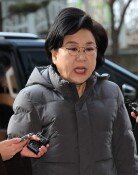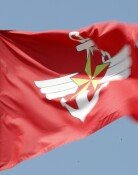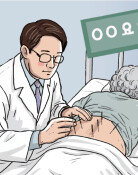Korean Airports on Alert for Terror
Korean Airports on Alert for Terror
Posted August. 12, 2006 10:21,
You cant take away this liquor that I bought for my relatives. Even lip gloss is prohibited?
Travelers leaving for abroad from Incheon International Airport on August 11 had to endure significant inconveniences because of the strengthened security check for their carry-on luggage.
With the plan for a terror attack on passenger airplanes being revealed in the U.K. that involved carrying liquid onto airplanes bound for the U.S. from the U.K., disputes have arisen regarding the taking away of passengers belongings.
The U.S. and U.K.-bound passengers had to go through an additional security check in front of boarding gates after being checked at the security checkpoint. During the double checking, all belongings which appeared to be a liquid, including tube-type lip glosses, facial creams and toothpastes, were seized.
More than 20 items were seized in the second checking of passengers for the New York-bound flight UA 800, which was to depart at 12:43 p.m.
Although airline officials gave passengers information on items that they could not bring with them aboard at check-in counters, it seems that passengers did not fully understand the information.
Kim Na-yeon, a Korean Air official working at a check-in counter, said, Explaining about items prohibited on the plane and helping passengers relocate such items to their checked-in luggage doubled the ticketing time.
Duty-free shops in the airport were crowded by customers who wanted to refund the liquid goods they bought in downtown duty-free stores. Each duty-free shop gave a full refund for items like alcohol that passengers were prohibited from bringing with them on board at its place of delivery in the airport.
Kwon Eui-suk, who works at the place of delivery for Lotte Duty Free, said, Customers had to wait 30 to 40 minutes during the peak time because of the long lines of those who wanted a refund.
Duty free stores in the airport tried not to sell liquid items, including liquors and cosmetics, to passengers bound for the U.S. and the U.K. When customers wanted to buy liquid items, the stores delivered goods through freight transport instead of handing them out to customers.
Each travel agency was busy letting its customers know about the reinforced security check. Lotte Tour gave a call to each customer leaving for the U.S. that morning to inform them about the items that they could not carry on the plane and to make sure that they arrived at the airport at least three hours before their departure time.
Meanwhile, those who arrived at Incheon Airport on OZ 522, which departed from Heathrow Airport at 3:53 p.m. that day, were holding transparent plastic bags which contained their belongings, such as their wallets and passports.
That was because their carry-on baggage was prohibited altogether, not to mention liquid items, when they left the U.K. Lee Han-jong, a 27-year-old student aboard the plane, said, My travel agency told me to be at the Heathrow Airport four hours before departure, and I had to take off my belt and shoes while being checked at the airport.
The aviation security alert was raised by two levels from green (low alert) to yellow (elevated). The security alert system has five levels: green (low), blue (guarded), yellow (elevated), orange (high) and red (severe) around noon that day.
Accordingly, the immigration office beefed up entry checks, asking travelers from Arab countries of their destinations and estimated period of stay. Also, they tried to find out the whereabouts of terrorist suspects and illegal aliens who formerly supported terrorists.
Incheon International Airport police expanded their patrol zone from 17 to 26 posts, and dispatched a fully equipped commando team to the passenger terminal. Ten commando members patrolled the inside of the airport with two watchdogs.
min07@donga.com







